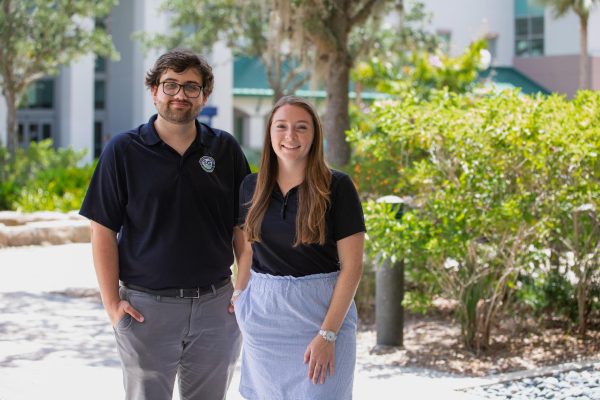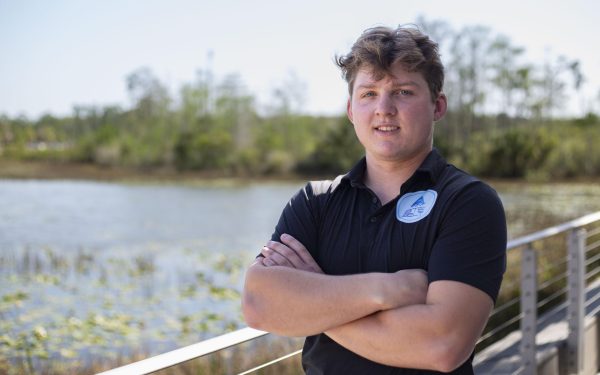Nursing Program Receives Funding in Battle Against Nursing Shortage
May 30, 2023
FGCU’s nursing department received a last-minute influx of funding from the Florida government that opened new opportunities for students and gave a much-needed bump that paves the way for future expansion.
Gov. Ron DeSantis’ administration announced early in 2023 that the Prepping Institutions, Programs, Employers and Learners through Incentives for Nursing Education program, or PIPELINE, granted schools across the state more funding.
The statewide allotment includes $79 million for “high-performing nursing education programs in Florida,” the governor’s office said.
FGCU received $2.3 million from the PIPELINE grant.
Dr. Kelly Goebel, nursing program director and assistant professor, said the new funding allowed the program to increase its enrollment by 33% in just one year. She said the program has around 200 students.
“The goal is for us to continue to increase our enrollment and expand our programs,” Goebel said in a phone interview. “You know, we’re a smaller state school, and we really are here for our community.”
FGCU is one of the most competitive schools in the state despite being a smaller one. Goebel pointed to students’ high performances on the National Council Licensure Examination, also known as the NCLEX.
“We consistently outperform all of the other state schools,” she said. “If you look at all of the NCLEX licensure numbers, we are the highest in the Florida State University System, which we’re very proud of.”
Overall, FGCU ranks number two in Florida.
The 2023 PIPELINE funding allowed FGCU’s program to open up late admissions for more students seeking to attend one of the best nursing programs in the state.
“There had been a plan to increase the admission and enrollment into the program that had been in place for a while, but we needed some funding for that,” Goebel said. “So, it’s only been since 2023 that we’ve been able to really increase our numbers.”
Goebel referenced the comparison to other schools not just in terms of test pass rates, but the curriculum’s rigor as a whole.
“The reality is that we are all accredited by the same nursing organization. And what that means is that we all have to somehow, in some way, show that our curriculum is meeting […] those requirements,” she said.
“But I do think that, you know, we do have a quality program, we review our curriculum routinely. We evaluate ourselves, we evaluate our curriculum, we evaluate our outcomes, and when we see that we’re not meeting them, we make changes,” Goebel said. “That’s what we really should be doing to maintain the rigor of the program.”
Nursing student Kaylee Alsip said her acceptance allowed her to carry out her ideal career path of becoming a nurse with FGCU’s high-ranking program.
“FGCU is the top program in the state and is ideal for any student hoping to become an RN [registered nurse]. If these spots had not become available, it’s possible I would’ve had to attend a different school, with lower NCLEX pass rates and less opportunities,” she said in a digital statement
Alsip was asked her thoughts on other schools across Florida receiving money from the PIPELINE program.
“I definitely think increased funding at other Florida schools will give students the same opportunity I have been given,” she said. “Hospitals nationwide are experiencing a nursing shortage, so it is extremely important that schools produce as many nurses as possible.”
The nursing shortage is especially hitting Florida, and it’s part of why DeSantis pushed for more nursing funding.
“[PIPELINE] will meet a critical need of our state by ensuring we continue to have high-quality nursing graduates and by creating new opportunities for Floridians interested in healthcare,” DeSantis said in January.
According to a report from the Florida Hospital Association, Florida is predicted to be short on more than 37,000 nurses by 2035. They estimated that 2,300 additional registered nurses are needed per year.
Both Alsip and Goebel said that there is plenty of room for FGCU’s nursing program to grow.
“I think that FGCU has wonderful opportunities for the nursing students already. However, if more funding becomes available, I feel as though it should go towards our simulation laboratories,” Alsip said. “Having as many of these as possible would allow more students to practice at the same time.”
Goebel explained that for the program to grow, all aspects of it must do the same. The program needs faculty to grow its students; it needs physical building space to store those faculty, classrooms, laboratories and other areas; and perhaps most challenging, FGCU must find local hospitals to place students for their on-job experience as part of the curriculum.
“We can’t grow a program and grow our enrollment without having nursing faculty, and in as much as there’s a nursing shortage, we have a shortage of nursing faculty,” Goebel said.
“We need physical space […] We need a lab that’s big enough, you know… simulation areas that are big enough,” she said. “We also need placements in the hospitals, and that has been a concern for schools of nursing [all] over the country.”
Goebel has been with FGCU’s nursing program since 2018 and became the director in 2020.
“My favorite part is seeing the students grow, and seeing them graduate, and see their body of knowledge expand,” Goebel said. “To see that growth from when they first enter our program, until the day that they graduate and are ready to go out into the nursing world, is inspiring to me.”
“It’s very gratifying. I’m really proud of our students. And I’m really proud of our faculty and our staff for helping them along their journey.”











































